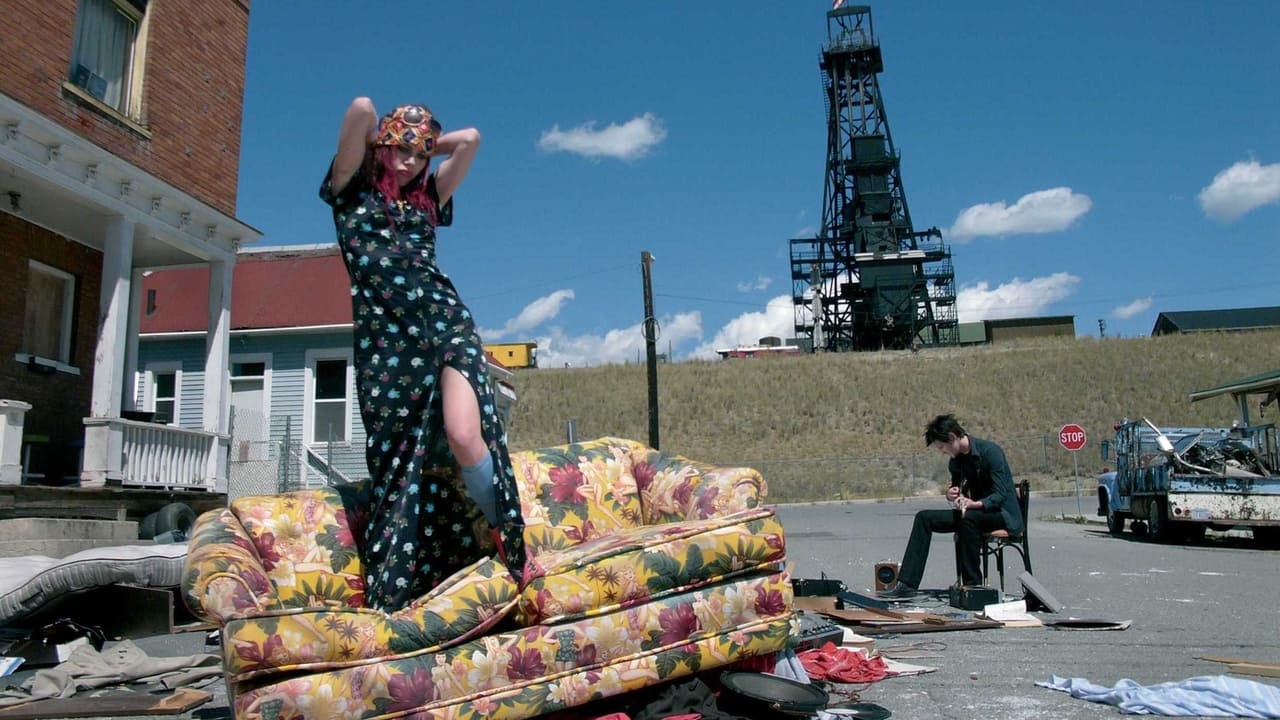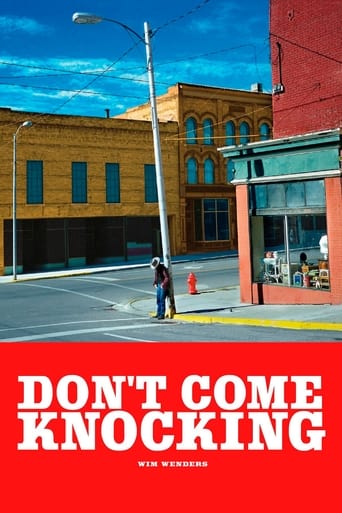



A different way of telling a story
n my opinion it was a great movie with some interesting elements, even though having some plot holes and the ending probably was just too messy and crammed together, but still fun to watch and not your casual movie that is similar to all other ones.
View MoreBlistering performances.
It is encouraging that the film ends so strongly.Otherwise, it wouldn't have been a particularly memorable film
View MoreWim Wenders collaborated with Sam Shepard two decades ago on "Paris, Texas". That film starred Harry Dean Stanton as Travis, an elderly man who travels from Texas to Los Angeles in the hopes of reconciling with both his estranged son and ex-wife. After failing to atone for his obsessively jealous, violent past, Travis disappears into the desert from which he came."Don't Come Knocking" tells virtually the same tale. Also written by Shepard, it finds Shepard playing an ageing actor who abandons the set of his latest western in order to visit his mother in the small town of Butte, Montana. Once there he attempts to reconcile with his two illegitimate children, and the waitress who gave birth to one. Again bookended by the desert, the film charts a very broad metaphorical journey out of a forlorn Old West - with its preponderance for sex, violent masculinity and philandery - and into the town of Butte. Butte's portrayed as a place in which time stands still, its inhabitants living in the wreckage of Shepard's last visit.The film's different from "Paris, Texas" in minor ways. Shepard's naive and seemingly less guilt-stricken than Travis was in "Texas". Meanwhile, the family he's left behind seem to be coping perfectly fine without him. They're stronger, less vulnerable and far less bitter than their counterparts in "Texas". Indeed, they all eventually forgive and pity Shepard. And while Travis seemed consigned to a life of loneliness, and even death, Shepard's given a quasi heroic ending, waving a cowboy's hat and riding a horse off into the sunset while a film crew looks on. Caccooned in the past, he's less immediately threatening than Travis.These differences are minor, though. For the most part, "Don't Come Knocking" is wholly inferior to "Paris, Texas". Wenders and Shepard admit to making up their script as they went along, don't seem to have any definitive goal in mind, and their film features 2 or 3 silly moments, all of which involve Shepard's son throwing incredulous tantrums. Elsewhere the film trades in clichés, though actresses Sarah Polley and Jessica Lange manage to do special work with their characters. Lange in particular plays her part somewhat unconventionally, her character masking pain with private humour.Despite its problems, "Don't Come Knocking" looks amazing. Virtually every scene is shot with an interesting eye, Wenders lending the film a wonderful sense of mood, space, colour and landscape. The visuals are so strong you almost don't care about the story, which is the case with most of Wenders' best films. Why is this? One must remember that Wenders often travels the world with a Polaroid camera, taking photos of interesting locales, architecture, buildings and landscapes. He then compile these photos into private albums. Often his films then become "excuses" for "filming" these albums. "Don't Come Knocking", for example, was largely made as an excuse to shoot the town of Butte, which Wenders had visited and photographed over a decade earlier. The town strongly reminded him of Edward Hopper, a number of whose paintings Wenders emulates here."Don't Come Knocking" is also heavily influenced by Michelangelo Antonioni, Nicholas Ray and Yasujiro Ozu. Many of these artists Wenders has himself collaborated with. Wenders' 1980 documentary, "Lightning on the Water", for example, was about Ray's last days, 1985's "Tokyo Ga" was a documentary on Ozu, and he collaborated with Antonioni on 1995's "Beyond the Clouds". Significantly, all these artists, as well as Hopper, are typically termed "existential artists" (though the term has perhaps lost all useful meaning). Wenders also labels himself an "existential director", and is generally preoccupied with alienation and questions of self-identity. Occasionally his Christian beliefs influence his films as well.Perhaps no other director has made as many "road movies" as Wenders. He'd even name his production company "Road Movies", and almost always uses the genre as a kind of metaphor for journeys of self discovery or escape. But the way in which Wenders merges European modernism with America genre filmmaking (he's in love with Americana, American culture, music, iconography etc) has rightfully led to much criticism. His is a kind of romanticised alienation, a designer existentialism, overly preoccupied with outer decor and style. You see that with "Don't Come Knocking", its characters and plot an afterthought, whilst its buildings and vistas, shot lovingly in widescreen, like moving odes to Hopper, are the raison d'etre.8/10 – Eye-popping visuals and palatable mood make up for trite script. See Wenders' "Land of Plenty". Worth one viewing.
View MoreI think you gotta like Win Wnders films to enjoy this. I do and so thought it was okay ... hey, so it's no Paris Texas, that's a given but the style of the film is still pretty unique. Unfortunately I thought the characters were very thinly developed (apert from Jessica Lang's which was impressive) and hence the tension that could have been a major part of the film wasn't there. The rest are an unlikeable bunch (or unknowable). After I got over asking myself how the kid threw that lounge suite out the tiny window and then seeing that somehow the window had magically gotten bigger to try to hide that goof, I didn't mind the odd continuity flaw here and there. Unfortunately for Sam Shppard and Win Wenders, all their stuff is going to be compared to Paris and that's a tough ask. This was a pale imitation but easy enough to sit through if a bit slow in patches.
View MoreThis Movie tells you over and over how overwhelming life becomes because of obligations that exist before you arrive or set up as you go through life in one way or another and the realization that you don't have the depth that everyone expects you to have in any given situation. The character is trying to fill up the wide spaces in his heart but everything that belongs in the spaces is too demanding to cling to so he takes comfort in the wide spaces and emptiness of places. Watch the surrounding backdrops and how they parallel this character. You want more, you're supposed to. He wants more but doesn't know how to find comfort there. There just may not be any comfort in having closeness to anything or anyone. I definitely agree with the person who spoke of SAM's influence on the screenplay it's great. I thought performances were wonderful and liked the little surprises like George Kennedy and Tom Cruise and Tim Matthieson (The voice of Jonny Quest Eva Marie Saint is perfect and so is Jessica Lange and Tim Roth. Step outside the box and don't look for "Hollywoodland" formula, look for what the writer wanted to impart and then feel the movie for what it is, not what you want it to be!
View MoreI found this movie to be a reflection of the West, the Great American West. Don't Come Knocking is a 360 degree look at the cowboy icon. Especially the Hollywood Cowboy icon, which of course is quite different from what was any real cowboy who ever existed in the 'old' West. This movie pays homage to the western while also being an anti-Western, or un- Western. Maybe so many people love the clichéd mythos of the west they cannot look at reality, but this movie shows the reality. Howard Spence is an alcoholic womanizer, who is a movie star cowboy. Does he actually embody rugged individualism that is so broadly displayed in the the Western Themes, or is it really just an act he has clinged to all his life? And what is left if he realizes it's all been an act? The reality of a real cowboy is the man he finds in his escape from a movie set, a guy living in a shack. We find out that Howard is not a likable man, he doesn't call his mother, and has never really cared for or about anyone other than himself. This is the cowboy story, the aspects of the story no one wants to think about, or care about. The old girlfriend he abandoned long ago sees through him. Howard Spence personifies the West, a loner, miserable who hasn't seen his mother in 30 years, and has to come to terms with his indiscretions at some point when he discovers he has a son he never knew about. This movie has some homage to the great westerns, not only those from the 40s and 50s, but also Clint Eastwood, as so clearly referenced in the movie poster in the restaurant where ___ works. He's such a 'great hero' that we all love, the loner-savior cowboy who can't seem to have any lasting relationships with women. What is wrong with him? What is so great about him? That is what his son asks him, when he comes knocking after so many years of nothing.
View More